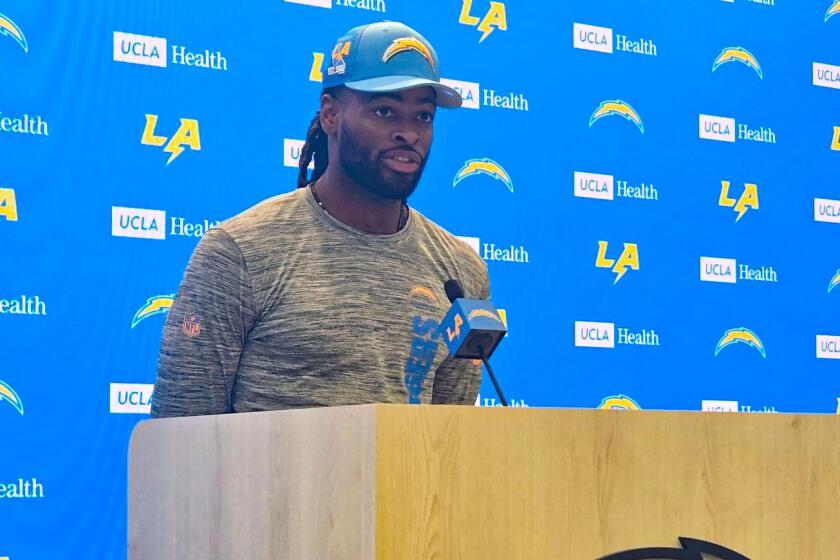Black Golfer Faced ‘Dirty Things, Every Step Of the Way’
- Share via
EAST CANTON, Ohio — Bill Powell sits in a golf cart on the fringe of the 16th green, comforted by the solitude that a fine course can provide.
Dressed in his best golf duds even though the years have stolen his game, he peers down the fairway, over green hills and up into puffy clouds. His lips tremble as he begins to speak.
“I think the ordinary person knows what our society is and knows the roadblocks that were put in my way,” says Powell, 79. “And I achieved in spite of it. There were just dirty things everywhere you went, every step of the way.”
Look for a black person who built and owns a golf course in America and the search will begin and end with Bill Powell. He is an unknown pioneer, someone who picked up a club when he was 9 and fell in love with the game.
“On a golf course, you can kill a lot of time,” Powell said. “To me, it’s just very relaxing. I don’t think there’s one thing you can put your finger on. It’s just addictive.”
They call him “Mr. P” at Clearview Golf Club in rural East Canton. Powell built a good deal of the course with his own hands. He made it a place where people of any color skin could pass an afternoon on lush fairways and soft greens.
On the side of the highway, a modest sign amid tall grass reads, “Clearview Golf Club. Public Welcome.”
Powell grew up in Minerva, a 10-mile drive from the course. His was the only black family in the small town. He was a caddie for a local white doctor when he was a boy and wanted to continue playing the game.
But the men who ran golf reminded him of his color, he said.
“I don’t like the word ‘forbidden,”’ Powell said. “We weren’t accepted in the society.”
So Powell decided he would build his own course. Turned down for a loan, he borrowed money from his brother, and two local black doctors joined him to buy the land.
Powell’s course opened in 1948 with nine holes. It took him almost 30 years to expand it to 18.
The 16th fairway, like most on the course, is lined with trees he and wife Marcella planted. She died this summer after managing the club office for years.
“We were married 56 years,” Powell says. “She was with me all the way. Just a beautiful lady.”
Marcella stood by her husband through all his struggles, from the rejections from the bank to vandals who tried to ruin Powell’s dream. When the course opened, a young Martin Luther King Jr. had just been ordained a Baptist minister. Jackie Robinson had only been in baseball for a year. To this day, golf is a sport stained by exclusion.
In his battle to make it a little less exclusive, Powell introduced his daughter, Renee, to golf when she was only 3.
“My dad got me playing golf before I even knew him, I guess,” she says.
Renee Powell went on to play the LPGA Tour in the 1960s and ‘70s, one of the few blacks who have made the tour.
“You ask me why there aren’t more black players,” her father said. “I ask it like this: How many owners of golf courses are black? Who was throwing their arms out? Who opened up their arms to them? Think about it. . . . It’s up to our society to get rid of this color problem.”
Powell turns a switch on the console of the golf cart, and its motor starts to hum. He gets comfortable and presses his foot to the throttle.
He tools around the course, deftly steering the buggy around trees and over bumps. He clearly loves what he has created.
“You know, golf is a nice, beautiful sport,” he said. “That’s the reason I stayed in it. You play the sport and kind of hope that most people in it are nice.”
The struggle shows in Powell’s face--eyes round and streaked with red, chin solid, forehead creased with suspicion. He is a warrior whose battles are behind him--well-fought, mostly won.
“I wouldn’t do it again,” he said. “It took a toll on my family, that’s all. It isn’t worth it. I could have done anything to take care of my family. I chose this, and I stuck with it, that was all. I’m not a quitter.”
More to Read
Go beyond the scoreboard
Get the latest on L.A.'s teams in the daily Sports Report newsletter.
You may occasionally receive promotional content from the Los Angeles Times.










